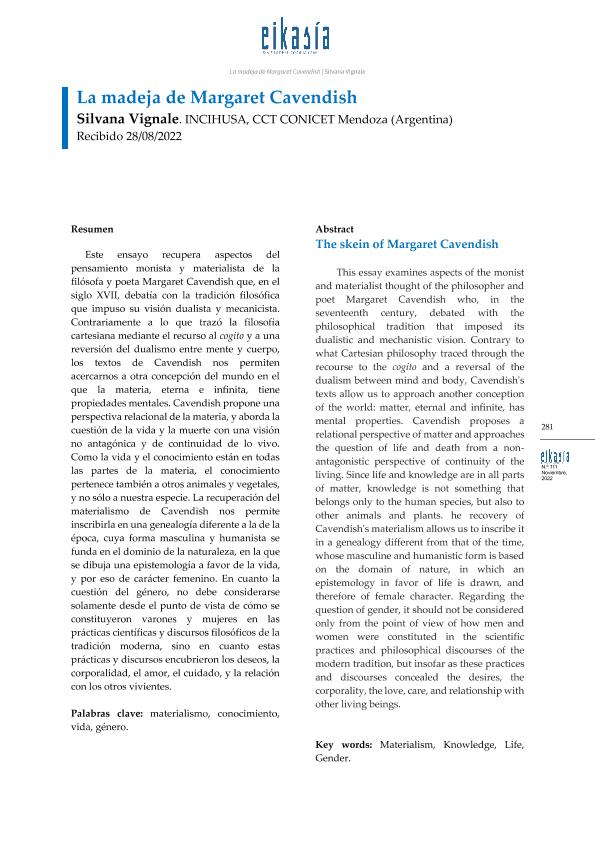Mostrar el registro sencillo del ítem
dc.contributor.author
Vignale, Silvana Paola

dc.date.available
2023-07-13T13:17:13Z
dc.date.issued
2022-11
dc.identifier.citation
Vignale, Silvana Paola; La madeja de Margaret Cavendish; Eikasía Ediciones; Eikasía; 111; 11-2022; 281-296
dc.identifier.uri
http://hdl.handle.net/11336/203689
dc.description.abstract
Este ensayo recupera aspectos del pensamiento monista y materialista de la filósofa y poeta Margaret Cavendish que, en el siglo XVII, debatía con la tradición filosófica que impuso su visión dualista y mecanicista. Contrariamente a lo que trazó la filosofía cartesiana mediante el recurso al cogito y a una reversión del dualismo entre mente y cuerpo, los textos de Cavendish nos permiten acercarnos a otra concepción del mundo en el que la materia, eterna e infinita, tiene propiedades mentales. Cavendish propone una perspectiva relacional de la materia, y aborda la cuestión de la vida y la muerte con una visión no antagónica y de continuidad de lo vivo. Como la vida y el conocimiento están en todas las partes de la materia, el conocimiento pertenece también a otros animales y vegetales, y no sólo a nuestra especie. La recuperación del materialismo de Cavendish nos permite inscribirla en una genealogía diferente a la de la época, cuya forma masculina y humanista se funda en el dominio de la naturaleza, en la que se dibuja una epistemología a favor de la vida, y por eso de carácter femenino. En cuanto la cuestión del género, no debe considerarse solamente desde el punto de vista de cómo se constituyeron varones y mujeres en las prácticas científicas y discursos filosóficos de la tradición moderna, sino en cuanto estas prácticas y discursos encubrieron los deseos, la corporalidad, el amor, el cuidado, y la relación con los otros vivientes.
dc.description.abstract
This essay examines aspects of the monist and materialist thought of the philosopher and poet Margaret Cavendish who, in the seventeenth century, debated with the philosophical tradition that imposed its dualistic and mechanistic vision. Contrary to what Cartesian philosophy traced through the recourse to the cogitoand a reversal of the dualism between mind and body, Cavendish's texts allow us to approach another conception of the world: matter, eternal and infinite, has mental properties. Cavendish proposes a relational perspective of matter andapproaches the question of life and death from a non-antagonistic perspective of continuity of the living. Since life and knowledge are in all parts of matter, knowledge is not something that belongs only to the human species, but also to other animals and plants. he recovery of Cavendish's materialism allows us to inscribe it in a genealogy different from that of the time, whose masculine and humanistic form is based on the domain of nature, in which an epistemology in favor of life is drawn, and therefore of female character. Regarding the question of gender, it should not be considered only from the point of view of how men and women were constituted in the scientific practices and philosophical discourses of themodern tradition, but insofar as these practices and discourses concealed the desires, the corporality, the love, care, and relationship with other living beings.
dc.format
application/pdf
dc.language.iso
spa
dc.publisher
Eikasía Ediciones
dc.rights
info:eu-repo/semantics/openAccess
dc.rights.uri
https://creativecommons.org/licenses/by-nc-nd/2.5/ar/
dc.subject
Materialismo
dc.subject
Conocimiento
dc.subject
Vida
dc.subject
Género
dc.subject.classification
Filosofía, Historia y Filosofía de la Ciencia y la Tecnología

dc.subject.classification
Filosofía, Ética y Religión

dc.subject.classification
HUMANIDADES

dc.title
La madeja de Margaret Cavendish
dc.title
The skein of Margaret Cavendish
dc.type
info:eu-repo/semantics/article
dc.type
info:ar-repo/semantics/artículo
dc.type
info:eu-repo/semantics/publishedVersion
dc.date.updated
2023-07-06T12:39:08Z
dc.identifier.eissn
1885-5679
dc.journal.number
111
dc.journal.pagination
281-296
dc.journal.pais
España

dc.journal.ciudad
Oviedo
dc.description.fil
Fil: Vignale, Silvana Paola. Consejo Nacional de Investigaciones Científicas y Técnicas. Centro Científico Tecnológico Conicet - Mendoza. Instituto de Ciencias Humanas, Sociales y Ambientales; Argentina
dc.journal.title
Eikasía
dc.relation.alternativeid
info:eu-repo/semantics/altIdentifier/url/https://www.revistadefilosofia.org/index.php/ERF/article/view/383
dc.relation.alternativeid
info:eu-repo/semantics/altIdentifier/doi/https://doi.org/10.57027/eikasia.111.383
Archivos asociados
